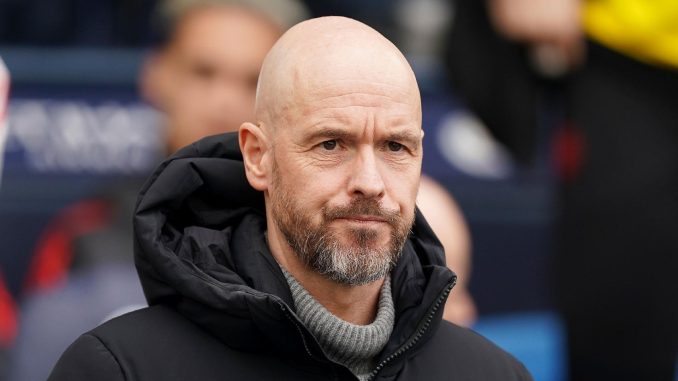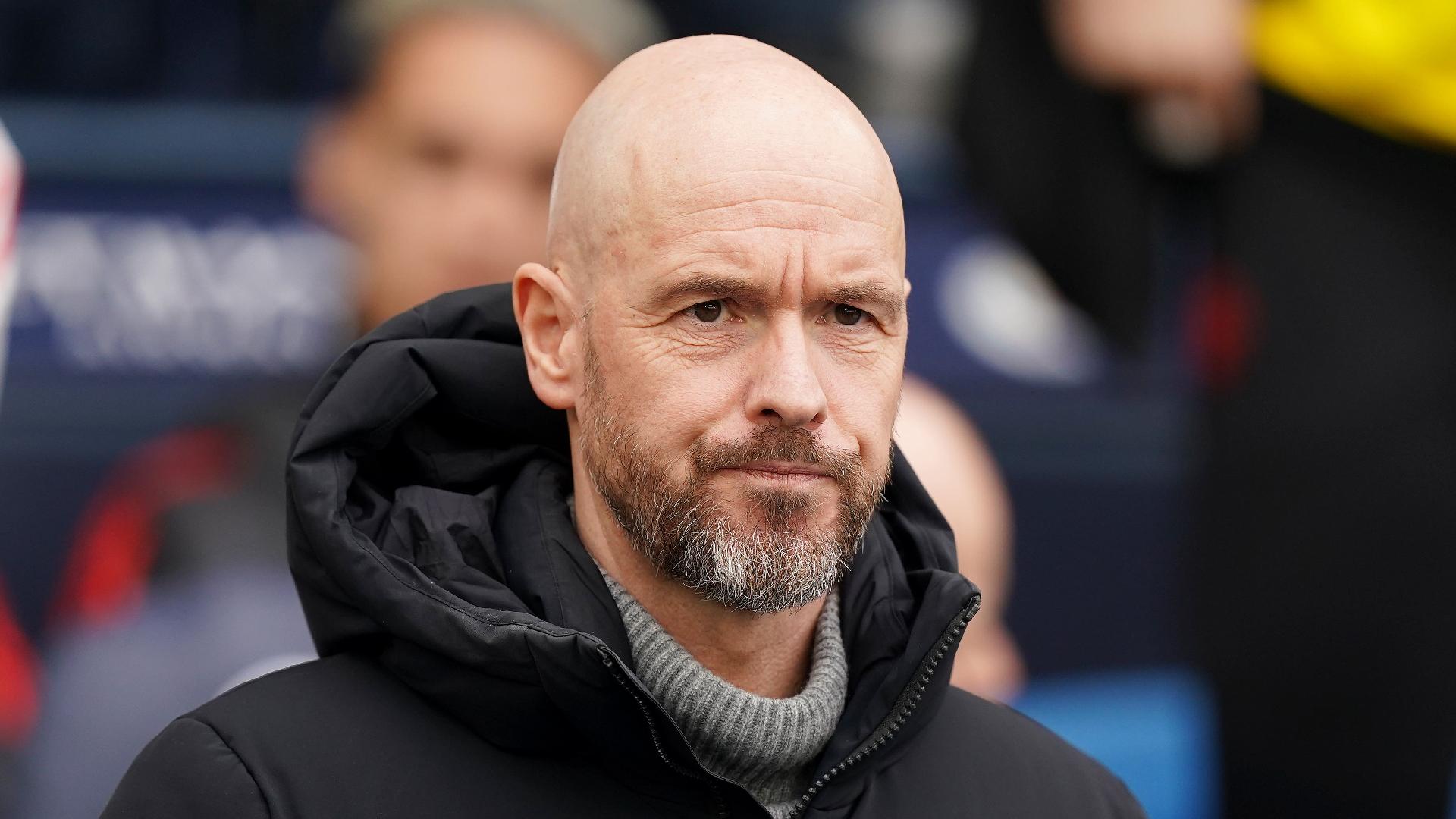
On Saturday, the Red Devils return to the scene of one of their most devastating defeats in recent years, one that quickly changed their tactical plan.
Brentford’s Gtech Community Stadium is not normally a ground that inspires dread in opponents, but the sight of the small, modern arena on the edge of west London is likely to bring back harrowing memories for Erik ten Hag when Manchester United face the Bees on Saturday night. It has been more than 19 months since United’s previous visit, but no one with any connection with the club is likely to forget it, especially those who played or sat in the dugout.
The shock 4-0 drubbing by Thomas Frank’s side in the second game of last season was one of the worst results United have endured in the Premier League era, and it had a profound effect on Ten Hag.
The Dutchman was hired by United on the strength of his achievements with Ajax, who had dominated Dutch football and reached the semi-finals of the Champions League playing attractive, possession football. Ten Hag had sought to impose that style on United in his first pre-season at the helm, but the battering in Brentford, which followed an opening day defeat at home to Brighton, forced him to have an urgent and radical rethink.
Targeted and torn apart
United had dominated possession against Brighton and did the same in their visit to Brentford, seeing 66 percent of the ball. However, they were ripped apart by their wily hosts, who hunted them in packs, robbed them of possession and pounced quickly and ruthlessly.
The Red Devils also played their part in their own downfall by making some horrendous individual mistakes. Cristiano Ronaldo was tackled in his own half for the opening goal and went down in a heap. Brentford quickly worked the ball to Josh Dasilva, whose tame low shot sneaked under the body of David de Gea.
It was the first of many dire errors from De Gea in what would prove to be his last season with United, as only a few minutes later the Spaniard made another mistake, passing out to Christian Eriksen, who was dispossessed, allowing Mathias Jensen to strike from close range.
Brentford’s third goal was helped by chaotic marking from a corner, with Diogo Dalot and Lisandro Martinez misjudging the flight of the ball and losing headers, leading to Ben Mee nodding home. Soon after, Bryan Mbeumo scored Brentford’s fourth goal in the space of 25 minutes, this one coming from a counter-attack launched from deep in their own penalty box.
Ripping up the playbook
The defeat had two short-term ramifications. Firstly, Ten Hag cancelled the players’ scheduled day off and made them run 14km, the difference in distance cover by United during the match compared to Brentford. In a show of solidarity, the Dutchman ran with the players.
The second ripple effect was that the club made two emergency and very expensive transfers, signing Casemiro from Real Madrid days later and then Antony from Ajax, costing the club around £155m ($195m) in transfer fees.
But the biggest impact was on the team’s style of play. Ten Hag quickly decided to dispense with the style he had devised in his first few weeks in charge and instead
played it safe, opting for a reactive, direct style not too dissimilar to that of his predecessors Ole Gunnar Solskjaer and Jose Mourinho.
In United’s next game against Liverpool, they had just 29.5% of the ball. But the difference was they beat Jurgen Klopp’s side 2-1. The trend continued, albeit to varying degrees, against Southampton, Leicester and Arsenal, winning each time.
United ended up finishing last season third in the Premier League but ranked sixth in terms of average possession, having 53.8% of the ball per game. They ranked seventh on goals scored, with 59, as many as Brentford. They also came seventh in passing accuracy.
Onana’s limited impact
There was expectation that United would become a more expansive, more possession-focused team in Ten Hag’s second season, especially after the club ruthlessly cut ties with De Gea and brought in Andre Onana, the Dutchman’s goalkeeper from his Ajax days who was widely admired for his ability to play out from the back.
But Onana has not helped United radically change their style. While he has been willing to take risks with the ball and has occasionally been burned, such as against Galatasaray in the Champions League, he has often had to resort to pumping the ball downfield due to the reluctance of his defenders to progress the ball from their own area.
The Cameroonian has helped United score one goal, Marcus Rashford’s stunner against Manchester City earlier this month, but that was from a long kick out of his hands that was chested down by Bruno Fernandes, not an intricate passing move he had engineered.
Only Martinez of United’s defenders is comfortable enough in possession to work with Onana, and he has missed much of the campaign. Incidentally, the Argentine could make his comeback from a knee injury against Brentford.
Honouring United’s DNA
Despite Onana’s arrival, the move away from possession football has not only continued into Ten Hag’s second season, it has accelerated. United are currently ranked ninth in terms of possession, with 50.1% per game. Ten Hag has addressed the change in style and been frank about it.
When asked during an interview with Viaplay last October when his United side would start playing like his Ajax team, he gave an emphatic response: “Never. We will never play that football. Because those were different players. This is also not why I came here. We are playing different football than I showed at Ajax because I have to, because I can’t play the same way.
“That is not in the DNA of Manchester United at all. The football at Ajax is very typical, here we will play much more directly. We also have the players for that, especially in attack.”
Ten Hag’s words took many by surprise and were widely criticised as him giving up on imposing his style on the Red Devils. But he was also speaking the truth; United have always had a direct style of based on quick wing play, harking back to the days of Sir Matt Busby’s teams of the 1950s and 1960s.
Sir Alex Ferguson’s first great side were renowned for their counter-attacking through wingers Ryan Giggs and Andrei Kanchelskis, while David Beckham and later Cristiano Ronaldo continued that tradition. Ferguson was also known for his pragmatism in the biggest matches and would rarely play on the front foot against the top opponents, even when at Old Trafford.
Louis van Gaal was the one manager who successfully managed to get United to play possession football, but the abiding memory of his two years in charge is one of boredom. Indeed, fans were so apathetic about the sideways passing that was routinely being served up that the club began to worry that many would not renew their season tickets.
As many goals as Luton
But Ferguson’s side were also renowned for winning and scoring lots of goals, two things Ten Hag has struggled to get his side to do this season while embracing the more direct style. United are ranked 13th in the league on goals scored with just 39, as many as Luton Town and Wolves. They are ranked seventh when it comes to shots per match and 10th in terms of shots on target per match.
They do rank highly in unwanted statistics, conceding the third-highest amount of shots per match in the Premier League, only behind Luton and bottom-placed Sheffield United. They are number one in one metric: being caught offside, a true demonstration of how intent they are to play direct, attacking football.
Given their low rank in so many metrics, it is perhaps surprising that United are as high as they are in the table, sitting sixth and still in with an outside shot of qualifying for the Champions League. They are also in the semi-finals of the FA Cup, and that is down to the star quality within their squad, containing potential match-winners in Bruno Fernandes, Marcus Rashford, Alejandro Garnacho and Rasmus Hojlund.
‘Never seen before’
When it comes to style, United are outliers. No top club plays like them or sees as little as the ball as they do, with the possible exception of Atletico Madrid. Indeed, Jamie Carragher claimed last month that United “defend like a team I’ve never seen before.” He added: “They like to press high with a deep block. It’s impossible. They are trying to do two things at the same time, you can only do one thing or the other.”
Carragher was referring to the huge amount of space United tend to leave in midfield, which has seen the likes of Fulham, Bournemouth and Brighton play through them at Old Trafford with ease. The former Liverpool defender also pointed out the fact that United’s personnel do not suit their chaotic, direct style. When you consider that United have had to lean on 36-year-old Jonny Evans many times this season, and that their other centre-backs Harry Maguire and Raphael Varane are not known for their pace, nor are midfielders Casemiro and Christian Eriksen, Carragher certainly has a point.
“They’ve got no pace at the back and they have a lack of legs in midfieldl,” he added. “Another big problem for them is when they’ve got the ball. These players can’t receive the ball in the positions they take up, so actually there is a massive problem for Manchester United when they’ve got the ball. How many times have we seen Manchester United players having to run 40 yards back towards their own goal?”
New beginning or false dawn?
However, United’s success last season and glimpses of this campaign offer hope that Ten Hag’s style does have life in it. As the Dutchman has never tired of pointing out, his side are capable of consistency and results when he has all his best players available. And, contrary to Carragher’s claim, he does have the personnel to play in the way he wants.
Garnacho relishes running into space on the counter-attack and is developing into one of the stars of the future. Hojlund was just finding his feet in the team before he got injured in February. Amad Diallo’s impressive performance against Liverpool as a substitute showed he can also thrive in a reactive system due to his willingness to win the ball back and hare downfield on the counter, as he did to win the match in the 121st minute.
If Ten Hag can guide United back into the Champions League and deliver the FA Cup, especially toppling Manchester City in the final, then he deserves the chance to show he can make this so called “impossible” style work. And if his best players, particularly Garnacho, stay injury-free, he might just pull it off.
The final stretch of United’s season begins on Saturday, back at the place where Ten Hag reached arguably his lowest point. But Brentford is also the place where he realised he needed to reshape his team and embrace new ideas to fit his new surroundings. Saturday’s result will be a good indication of whether his project still has a future.
Copyright © 2025
Leave a Reply